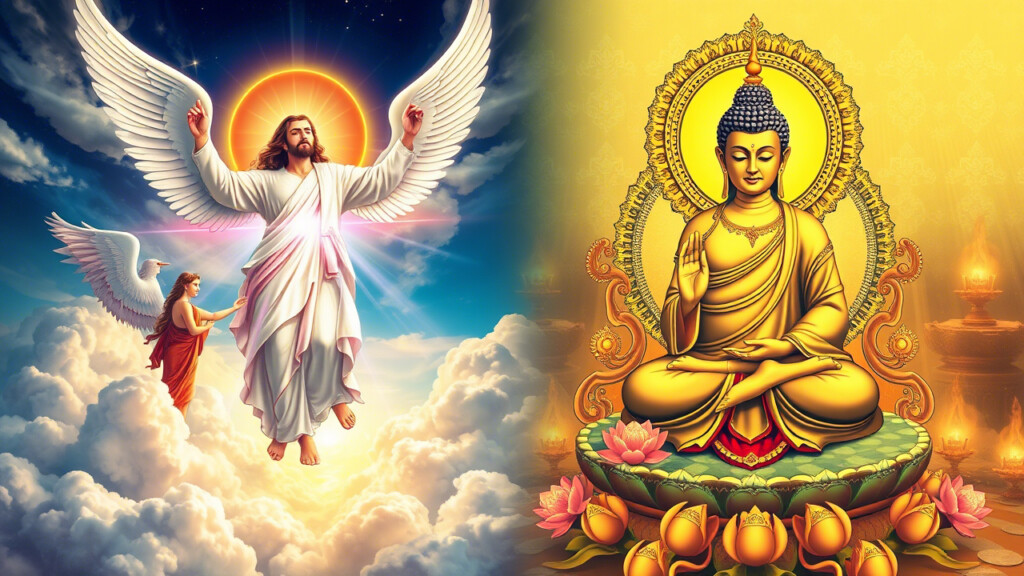Have you ever wondered—if you live a virtuous life, where will you go after death? A place filled with light, where angels soar, and music echoes in the air? Or a state of absolute tranquility, where suffering and reincarnation cease to exist?

Heaven and Nirvana—two concepts that may seem similar at first but represent two entirely different paths. One is a reward, the other is liberation. One promises eternity, the other leads to the cessation of all attachments.
So, are these two concepts fundamentally different, or are they just two versions of the same ultimate truth?
1. Two Paths – Two Destinations
Heaven (Heaven in Christianity, Jannah in Islam, Svarga in Hinduism) is the place where righteous souls go after death. It is depicted as a realm of light, joy, and eternal bliss. The common imagery includes golden gates, angels, and the presence of the Divine.
📖 The Bible describes it: “God’s dwelling place is among the people, and He will wipe every tear from their eyes. There will be no more death or mourning or crying or pain.” (Revelation 21:3-4).
📖 The Quran describes it: “Gardens of bliss, flowing rivers, and everlasting peace.” (Qur’an 55:46-78).
This concept assumes that the soul is immortal and continues to exist beyond death, aligning with Plato’s philosophy, where the soul aspires toward Truth, Goodness, and Beauty.
In contrast, Nirvana (Nibbana in Buddhism, Moksha in Hinduism) is not a place, but a state of being. The Buddha described it as “supreme tranquility,” where all suffering and the cycle of rebirth end (Dhammapada 203-204).
Why does Nirvana mark the end of the self?
Because according to Buddhism, the self is an illusion, formed by the Five Aggregates (skandhas: form, sensation, perception, mental formations, and consciousness). When these dissolve, the illusion of self disappears, leading to complete liberation.
🧐 If Heaven is like an eternal home where the soul continues to exist, then Nirvana is like the ocean, where every drop merges into emptiness, with no separate identity left.
2. Reward vs. Liberation
🎁 Heaven is a reward.
- It is attained through faith, kindness, and righteous actions.
- In Christianity, Heaven is reached through faith in God.
- In Islam, Jannah is reserved for those who lead a righteous and moral life.
🌊 Nirvana is liberation.
- There is no happiness or suffering, no “you” or “me.”
- According to the Majjhima Nikaya 26, Nirvana is when one “completely extinguishes craving.”
- It is not a reward but the cessation of all desires and attachments.
📜 How does one attain Nirvana?
Through the Eightfold Path: Right View, Right Thought, Right Speech, Right Action, Right Livelihood, Right Effort, Right Mindfulness, and Right Concentration.
🧐 If Heaven is like an eternal luxury resort, then Nirvana is when you no longer need a place to be because you have let go of existence itself.
3. Eternal Life or Dissolution?
Once, I asked a spiritual friend:
“If given the choice, would you rather live forever in Heaven or dissolve into Nirvana?”
He thought for a moment and said:
“Sounds fun—like Dr. Manhattan (Watchmen) wandering the universe, getting so bored he exiles himself to Mars… But dissolving completely? Nah, I’d rather sip coffee, listen to Alan Walker’s EDM, and enjoy a bit of life as it is!”
This response perfectly reflects the core difference between Heaven and Nirvana:
- Heaven promises eternal existence. The soul continues to feel, love, and experience. But is eternity truly a gift—or could it become a never-ending loop?
- Nirvana is complete cessation. No desires, no suffering, and no “self” to perceive anything at all.
🧐 So, what would you choose: an eternity that might become monotonous or a total dissolution where nothing matters anymore?
4. Is There a Middle Path?
Can a soul reach both Nirvana and Heaven at the same time?
🔸 The Buddhist celestial realms (Deva Loka) resemble Heaven, offering peace and pleasure, but they are still within the cycle of rebirth. A person can be reborn in a blissful realm but has not yet reached Nirvana.
🔸 Moksha in Hinduism is similar to Nirvana, but in some interpretations, the self merges with the Divine, which is closer to the idea of Heaven.
But if you think about your everyday life—you might already be experiencing a preview of both concepts!
😄 When payday arrives, you feel like you’re in Heaven: financial security, happiness, treating your friends to a grand meal.
🥲 But a few days later, as your bank balance dwindles, you start contemplating detachment, liberation, and dream of a world without financial stress—something like Nirvana!
🧐 So, do you desire eternal happiness, or do you seek to escape the exhausting cycle altogether?
Don’t answer too quickly—by the end of the month, your opinion might change! 😆
